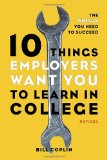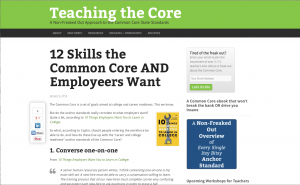
[dropcap]I[/dropcap]n my last post (you know, the one from two months ago), I shared some similarities between the Common Core's list of college- and career-readiness skills in literacy with the skills listed in Bill Coplin's book 10 Things Employers Want You to Learn in College. In my next post, I'm going to give that post's teeter-totter partner — in other words, what are some skills in Coplin's book that I love (and employers apparently do, too), but that the Common Core State Standards simply don't mention.
However, before I get to that post, I wanted to share two big ahas/truths and three clarifications, all of which were inspired by some or all of your comments on my last post (thanks for all of the comments, by the way!)
Two truths
Here are two broad points that are critical both in thinking about that last post and, even more importantly, in thinking about any discussion on standards, be they Common Core or otherwise. Please read and re-read these and, by all means, if I'm off-base or you disagree, push back in the comments.
1. No single teacher can make a kid develop any of these skills.
I strongly believe in the power of our calling as educators, but we cannot allow ourselves to freak out when we read lists like the one I compiled in my last post. As much as some folks may want to pinpoint my individual contribution to a student's academic development using the latest standardized test cocktail (right now, our state uses a state-created content test — given to Juniors; my students are freshmen — and the ACT; soon, they'll add the Smarter Balanced test to those two tests), that's just not how kids learn. There are at least three other huge factors in a kid's growth in the skill areas I listed in the last post:
- the kid's parent(s)
- the kid's other teachers and administrators
- the kid
Crazy, right? Look: the list above isn't a list of scapegoats; it is a list of co-laborers in the quest for a kid to live a fulfilling life. That's common sense; if any of us fancies ourselves a lone warrior in the battle for a kid's life, we're not being heroic–we're being quixotic. Here at Teaching the Core, we empower ourselves with common sense and then we go out and fight to make student flourishing more likely in our schools. Keep resisting the freak out, my friends; these skills are not your responsibility solely, but they are all of ours at least a little bit.
Please don't misread me: I'm not blaming poor student achievement on any one group, nor am I saying I as a teacher don't hold a big ol' mug of responsibility in my hand. I'm just saying that I'm definitely not God, and you probably aren't either. We do our best each day, we try to constantly improve, and we go home and sleep well.
This isn't a blank check for you to stop working on your abilities as an instructor and, yes, as a motivator; it is a blank check to give yourself a break after a solid day of work. Your job is to teach and grow; it's not to single-handedly produce test scores.
2. Focus is the key to impact.
The problem with most schools isn't that teachers aren't working hard enough — in fact, I've never found a school where anywhere close to the majority of teachers are mailing it in. The problem is actually the opposite: teachers are working too freaking hard on way too many things. If the Common Core end up being a win for American schools, it will be because teachers were given the permission and space — heck, the directive — to work on a few of them at a time.
Here at Teaching the Core, I advocate for the grouping of skills and strategies that I'm choosing to go big on with my students — there are only 6 of them. Your list could be the same, or it could be different, but, dude, you've got to have a short list.
If your administrators don't give you this kind of empowering permission (or if they forget that they gave it to you as soon as they attend the latest educonference), gift them with a common sense book like Mike Schmoker's Focus. You may not agree with everything he says, but his underlying premise is solid.
Three clarifications
Now that I've gotten the ranting out of my system, let me clarify three things that weren't super clear in my last post.
 1. Coplin's book is written for college students.
1. Coplin's book is written for college students.
The Teaching the Core community is mostly made up of K-12 educators, so I want to make clear that the book I was citing in my last post is called 10 Things Employers Want You to Learn in College on purpose 
(By the way, the book's companion website is pretty sweet. It explores the 10 skillsets described in the book, with everything from resources for further reading and quality explanatory videos.)
2. Yet Coplin's book is definitely useful for high schoolers.
I speak with my students frequently about the fact that there are no shortcuts to a successful life (thank you, Rafe Esquith), and that successful people are not just hard workers; they are strategic in the work that they do. So when I share excerpts of Coplin's book with my students — for example, before editing their “What concept in the 1800s unit was the most significant from both short- and long-term perspectives?” essays for world history class, I shared some of his thoughts on editing (see last post) — it's to empower them with more knowledge about what it takes to be successful.
Have any of you used this book or excerpts from it with your students? How did it go? Share in the comments below!
3. I am a knucklehead.
If you are in the market for a freelance editor, I might not be your guy. As some of you graciously pointed out, I misspelled “employeer” for a few days (see below). Oops. Muphry's Law states that, when you write something about editing or proofreading, you will inevitably make editing/proofreading errors. (Thanks to Travis for sharing Muphry's Law with me on Twitter; it was comforting.)

Next time on Dave's rantfest…
So next time I actually won't rant — I'll share a list of skills that Coplin mentions that totally aren't mentioned in the Common Core. It should promote some interesting chatter 
Giana says
Dave,
Just wanted to say that I LOVE your blog. You write with such a clear, humble, and humorous tone. I really appreciate it.
davestuartjr says
Giana, I just way to say THANK YOU for making this the comment I woke up to this morning. Have a great day and please keep in touch